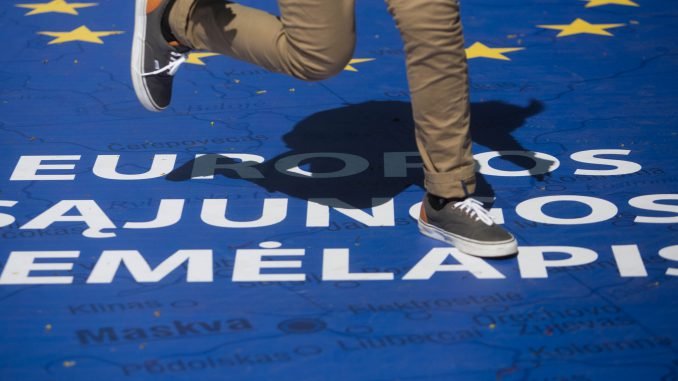
Lithuanians trust European Union institutions more than their peers in any other EU country, a recent Eurobarometer survey has shown. On average, Europeans’ trust in EU institutions has steered into the negative territory – more people distrust them than otherwise.
Sociologist Vladas Gaidys, director of the polling company Vilmorus, says that for at least the last ten years, Lithuanians have been unwavering euroenthusiasts – they trust the EU.
A matter of security
Laurynas Kasčiūnas, analyst at the Vilnius-based Eastern Europe Studies Centre, says that while the latest survey asked respondents to give their opinion about EU institutions, their answers nevertheless reflect their general attitude towards the EU as an organization.
Lithuanians’ favourable take, he says, is closely intertwined with security and geopolitics.
“For us, European integration is a guarantee of our security. Fifteen years ago, when we were seeking membership and began our integration into the EU, the dominant narrative was that of a return to the West, return home.
“Naturally, this doesn’t work in Western Europe as a factor that tints how people regard the EU. In the West, those of centre-right or right-wing persuasions have reservations about the EU. They primarily see it as an economic union, but when it comes to political integration, they keep their distance. That is less true in Lithuania, since the general perception is ‘the more Europe in Lithuania, the less Russia’,” Kasčiūnas says.
Money matters
Another factor behind Lithuanians’ favourable attitudes towards the EU is the financial benefits that membership brings, Kasčiūnas believes. EU money has overshadowed some of the problems of the organization, although it is not the main factor shaping how Lithuanians see the EU, he adds.
“The economic wealth element in some ways covers up problems inherent in EU integration, its criticism and potential scepticism. Unlike, for instance, in Britain where the economy is more advanced and attitudes towards the EU are different.
“But I am not convinced that the economic factor is fully responsible here, since, for example, Latvians are more eurosceptic than us, even though they have just as much basis to favour the EU and its institutions as we do,” Kasčiūnas says.
Arijus Katauskas, a public relations specialist at Nova Media, is also not convinced that financial support is behind the high regard that Lithuanians have for the European Union. Ordinary Lithuanians, he says, have felt little direct impact of EU money on their purses.
Meanwhile Gaidys, the sociologist, says that, according to various surveys, EU financial support plays an important role, especially in more peripheral areas in Lithuania. Other important factors include the ability to travel freely, to work and study abroad, something that most Lithuanians could hardly imagine just several decades ago.
“I think that another reason why Lithuanians trust EU institutions is that they have very little trust in Lithuanian institutions. Lithuania is next to last [in terms of trust in national institutions]. Lithuanians tend to think that their voice is more meaningful in EU institutions than in Lithuania.
“Ideological reasons, general values, unity – these are important for other countries that have favourable opinions about the EU, but in Lithuania they play a secondary role,” Gaidys says.
No opposition voices in Lithuania
Katauskas says that he has spotted very little public opposition to the EU in Lithuania. Lithuanians have long held positive views about the union and its institutions – and nothing has happened to change that.
“Very few people speak ill of the EU, while most Lithuanian politicians and experts do not criticise the EU or its institutions.
“When we were working towards our membership in NATO and the EU, our state institutions and politicians accomplished a great deal. We celebrate our accession to these organizations as national holidays, we are always happy that we are in the EU, and now in the eurozone. That is the attitude that has been passed on and no one has challenged it,” Katauskas says.
Kasčiūnas, of Eastern Europe Studies Centre, adds that, in the Lithuanian political system, there is virtually no opposition to the EU. Only now, he notes, do voices appear in the public sphere raising questions about where Europe is going and what kind of Europe we want.
Kasčiūnas says he would like to see more independent thinking about the EU, especially among Lithuania’s political elites.
“The Lithuanian mentality still contains colonialist elements – ‘we need a master to protect us’. Naturally, a country needs allies among the powerful nations, it needs security guarantees. But I’d like to see less of the post-colonial thinking,” he says.

Be the first to comment